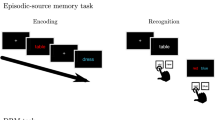Abstract
This study examined the effect of false memory on temporal perception. The Deese–Roediger–McDermott (DRM) paradigm, which elicits false recognition of a nonpresented word, was used to determine whether the perceived duration of falsely remembered words was longer than that for control words. The study results revealed that the perceived duration for falsely recognized words was longer than that for correctly rejected words. This is the first study to show the effect of false memory on temporal perception and suggests that temporal perception can be affected by conceptual fluency without any perceptual repetition.


Similar content being viewed by others
Notes
We thank a reviewer for pointing out this possibility.
References
Brown, S. W. (1997). Attentional resources in timing: Interference effects in concurrent temporal and nontemporal working memory tasks. Perception and Psychophysics, 59, 1118–1140.
Deese, J. (1959). On the prediction of occurrence of particular verbal instructions in immediate recall. Journal of Experimental Psychology, 58, 17–22.
Fraisse, P. (1984). Perception and estimation time. Annual Review of Psychology, 35, 1–36.
Jacoby, L. L., Kelley, C. M., & Dywan, J. (1989). Memory attributions. In: H. L. Roediger, & F. I. M. Craik (Eds.), Varieties of memory and consciousness: Essays in honor of Endel Tulving (pp. 391–422). Hillsdale, NJ: Erlbaum.
Hicks, J. L., & Starns, J. J. (2005). False memories lack perceptual detail: Evidence from implicit word-stem completion and perceptual identification tests. Journal of Memory and Language, 52, 309–321.
Hoshino, Y. (2002). False recall created by learning related words: A comparison between blocked presentation and random presentation of related words. The Japanese Journal of Psychonomic Science, 20, 105–114.
Miyaji, Y., & Yama, H. (2002). Making Japanese lists which induce false memory at high probability for the DRM paradigm. The Japanese Journal of Psychonomic Science, 21, 21–26.
Mo, S. S. (1975). Time production of duration as a function of numerosity. Bulletin of the Psychonomic Society, 5, 165–167.
Mo, S. S., & Michalski, V. A. (1972). Judgment of temporal duration of area as a function of stimulus configuration. Psychonomic Science, 27, 97–98.
Roediger, H. L. III, & McDermott, K. B. (1995). Creating false memories: Remembering words not presented in lists. Journal of Experimental Psychology: Learning, Memory, and Cognition, 21, 803–814.
Schiffman, H. R., & Bobko, D. J. (1974). Effects of stimulus complexity on the perception of brief temporal intervals. Journal of Experimental Psychology, 103, 156–159.
Thomas, E. A. C., & Cantor, N. E. (1975). On the duality of simultaneous time and size perception. Perception and Psychophysics, 18, 44–48.
Whittlesea, B. W. A. (1993). Illusion of familiarity. Journal of Experimental Psychology: Learning, Memory, and Cognition, 19, 1235–1253.
Witherspoon, D., & Allan, L. G. (1985). The effect of a prior presentation on temporal judgments in a perceptual identification task. Memory & Cognition, 13, 101–111.
Zakay, D. (1993). Time estimation methods—Do they influence prospective duration estimates? Perception, 22, 91–101.
Acknowledgement
This research was supported by a grant to the first author from the Research Fellowships of the Japan Society for the Promotion of Science for Young Scientists.
Author information
Authors and Affiliations
Corresponding author
Rights and permissions
About this article
Cite this article
Ono, F., Kawahara, Ji. The effect of false memory on temporal perception. Psychological Research 72, 61–64 (2008). https://doi.org/10.1007/s00426-006-0073-3
Received:
Accepted:
Published:
Issue Date:
DOI: https://doi.org/10.1007/s00426-006-0073-3



